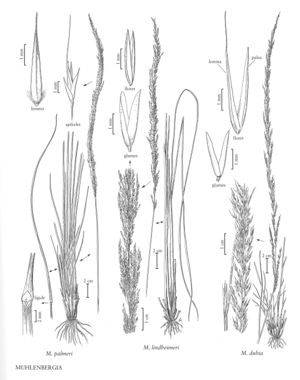Difference between revisions of "Muhlenbergia palmeri"
FNA>Volume Importer |
imported>Volume Importer |
||
| (4 intermediate revisions by 2 users not shown) | |||
| Line 7: | Line 7: | ||
|synonyms={{Treatment/ID/Synonym | |synonyms={{Treatment/ID/Synonym | ||
|name=Muhlenbergia dubioides | |name=Muhlenbergia dubioides | ||
| − | |authority= | + | |authority= |
| + | |rank=species | ||
}} | }} | ||
|hierarchy=Poaceae;Poaceae subfam. Chloridoideae;Poaceae tribe Cynodonteae;Muhlenbergia;Muhlenbergia palmeri | |hierarchy=Poaceae;Poaceae subfam. Chloridoideae;Poaceae tribe Cynodonteae;Muhlenbergia;Muhlenbergia palmeri | ||
| Line 20: | Line 21: | ||
-->{{Treatment/Body | -->{{Treatment/Body | ||
|distribution=Ariz. | |distribution=Ariz. | ||
| − | |discussion=<p>Muhlenbergia palmeri grows in rocky drainages and in sandy soil along creeks, at elevations of 1000-2100 m. Its range extends from southern Arizona into northern Mexico.</p> | + | |discussion=<p><i>Muhlenbergia palmeri</i> grows in rocky drainages and in sandy soil along creeks, at elevations of 1000-2100 m. Its range extends from southern Arizona into northern Mexico.</p> |
|tables= | |tables= | ||
|references= | |references= | ||
| Line 29: | Line 30: | ||
-->{{#Taxon: | -->{{#Taxon: | ||
name=Muhlenbergia palmeri | name=Muhlenbergia palmeri | ||
| − | |||
|authority=Vasey | |authority=Vasey | ||
|rank=species | |rank=species | ||
| Line 36: | Line 36: | ||
|basionyms= | |basionyms= | ||
|family=Poaceae | |family=Poaceae | ||
| − | |illustrator=Linda A. Vorobik | + | |illustrator=Linda A. Vorobik;Annaliese Miller |
| + | |illustration copyright=Utah State University | ||
|distribution=Ariz. | |distribution=Ariz. | ||
|reference=None | |reference=None | ||
| Line 42: | Line 43: | ||
|publication year= | |publication year= | ||
|special status= | |special status= | ||
| − | |source xml=https:// | + | |source xml=https://bitbucket.org/aafc-mbb/fna-data-curation/src/200273ad09963decb8fc72550212de541d86569d/coarse_grained_fna_xml/V25/V25_774.xml |
|subfamily=Poaceae subfam. Chloridoideae | |subfamily=Poaceae subfam. Chloridoideae | ||
|tribe=Poaceae tribe Cynodonteae | |tribe=Poaceae tribe Cynodonteae | ||
Latest revision as of 17:58, 11 May 2021
Plants perennial; cespitose, not rhizomatous. Culms 50-100 cm tall, 2-4 mm thick, erect, rounded near the base, not conspicuously branched, not rooting at the lower nodes; internodes mostly glabrous, sometimes puberulent below the nodes. Sheaths longer than the internodes, smooth or scabridulous, not becoming spirally coiled when old; ligules 1-3 mm, firm to membranous, truncate, ciliolate; blades 15-50 cm long, 1-3.5 mm wide, flat to involute, smooth or scabridulous abaxially, scabrous adaxially. Panicles 15-35 cm long, 0.5-2(3) cm wide; primary branches 0.5-8 cm, appressed; pedicels 1-6 mm, hispidulous. Spikelets 3-4.3 mm, yellowish-brown to purplish. Glumes subequal, (1.7)2-3.1 mm, about 3/4 as long as the florets, scabridulous distally, 1-veined, apices acute to acuminate, awned, awns to 1.5 mm; lemmas 3-4.3 mm, lanceolate, calluses hairy, hairs to 1.5 mm, lemma bodies scabridulous, apices acuminate, awned, awns 3-10 mm, straight; paleas 2.9^1.2 mm, lanceolate, scabridulous, acute to acuminate; anthers 1.5-2.5 mm, yellow to purple-tinged. Caryopses 2-3 mm, fusiform, brownish. 2n = unknown.
Discussion
Muhlenbergia palmeri grows in rocky drainages and in sandy soil along creeks, at elevations of 1000-2100 m. Its range extends from southern Arizona into northern Mexico.
Selected References
None.
